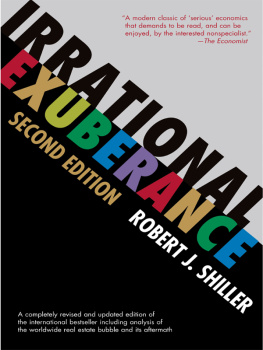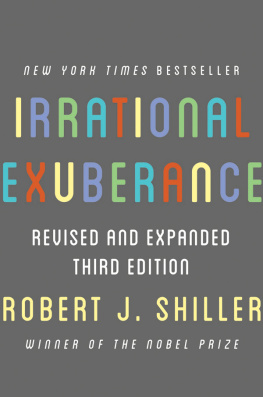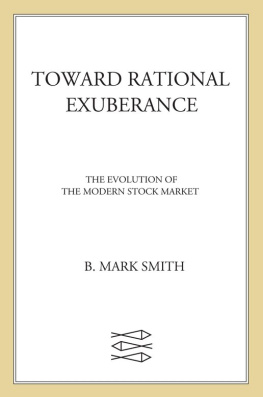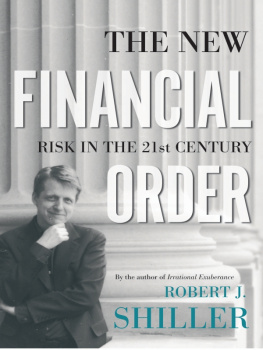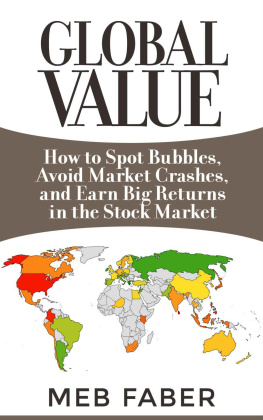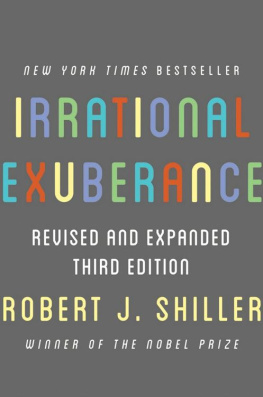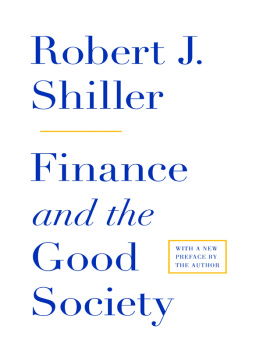Shiller - Irrational exuberance reconsidered: the cross section of stock returns
Here you can read online Shiller - Irrational exuberance reconsidered: the cross section of stock returns full text of the book (entire story) in english for free. Download pdf and epub, get meaning, cover and reviews about this ebook. City: Princeton, year: 2005, publisher: Princeton University Press, genre: Business. Description of the work, (preface) as well as reviews are available. Best literature library LitArk.com created for fans of good reading and offers a wide selection of genres:
Romance novel
Science fiction
Adventure
Detective
Science
History
Home and family
Prose
Art
Politics
Computer
Non-fiction
Religion
Business
Children
Humor
Choose a favorite category and find really read worthwhile books. Enjoy immersion in the world of imagination, feel the emotions of the characters or learn something new for yourself, make an fascinating discovery.
Irrational exuberance reconsidered: the cross section of stock returns: summary, description and annotation
We offer to read an annotation, description, summary or preface (depends on what the author of the book "Irrational exuberance reconsidered: the cross section of stock returns" wrote himself). If you haven't found the necessary information about the book — write in the comments, we will try to find it.
Shiller: author's other books
Who wrote Irrational exuberance reconsidered: the cross section of stock returns? Find out the surname, the name of the author of the book and a list of all author's works by series.
Irrational exuberance reconsidered: the cross section of stock returns — read online for free the complete book (whole text) full work
Below is the text of the book, divided by pages. System saving the place of the last page read, allows you to conveniently read the book "Irrational exuberance reconsidered: the cross section of stock returns" online for free, without having to search again every time where you left off. Put a bookmark, and you can go to the page where you finished reading at any time.
Font size:
Interval:
Bookmark:

Disclosure. The author is the co-founder and principal of two U.S. firms: Macro Securities Research LLC (headed by Allan Weiss) and Macro Financial LLC (headed by Samuel Masucci) that are in the business of issuing securities. Nothing in this book constitutes or should be construed as either an offer to sell or the solicitation of an offer to buy any securities, including any securities that may at any time be offered for sale by Macro Securities Research LLC or Macro Financial LLC. In the United States, offers to sell and solicitations of offers to buy any securities may be made only by a prospectus (as defined in the Securities Act of 1933, as amended) delivered to the prospective purchasers. Similar regulations apply in other countries. This book contains various forward-looking statements based on the author's projections, hypotheses, forecasts, estimates, beliefs, and prognoses about future events. All forward-looking statements contained herein reflect solely the author's opinions about such future events and are subject to significant uncertainty. Actual events may differ materially from those described in such forward-looking statements.
Copyright 2005 Robert J. Shiller
Published by Princeton University Press, 41 William Street, Princeton,
New Jersey 08540
In the United Kingdom: Princeton University Press, 3 Market Place,
Woodstock, Oxfordshire OX20 1SY
All Rights Reserved
Library of Congress Cataloging-in-Publication Data
Shiller, Robert J.
Irrational exuberance / Robert J. Shiller.2nd ed.
p. cm.
Includes bibliographical references and index.
ISBN 0-691-12335-7 (alk. paper)
1. StocksUnited States. 2. Stock exchangesUnited States.
3. StocksPricesUnited States. 4. Real propertyPricesUnited States. 5. Risk. 6. Dow Jones industrial average. I. Title.
HG4910.S457 2005
332.63'222'0973dc22 2004024789
British Library Cataloging-in-Publication Data is available
This book has been composed in Adobe Palatino and Berkeley Old Style Book and Black by Princeton Editorial Associates, Inc., Scottsdale, Arizona
Printed on acid-free paper. 
pup.princeton.edu
Printed in the United States of America
10 9 8 7 6 5 4 3 2 1

Figures
Tables

I n the preface to the first edition of this book, reproduced following this one, I described this book as a study of the millennium stock market boom, the boom that afflicted much of the world in the years leading up to 2000. A number of those who read the book have told me they think this book addressed a much broader subject. They are right: this book is really about the behavior of all speculative markets, about human vulnerability to error, and about the instabilities of the capitalist system.
When I was writing the first edition, mostly in 1999, the stock market boom seemed invincible. The S&P 500 index had gone up 34% in 1995, 20% in 1996, 31% in 1997, 26% in 1998, and 20% in 1999. Similar strings of stock market price increases had occurred in many other countries. So many years in a row of such spectacular increases could not be the result of mere chance, or so it seemed to many people thenand to the experts who encouraged this view. The stock market boom was widely viewed as the harbinger of a new economic era. But my book took a very different, and much dimmer, view of this stock market boom.
When the book appeared on store shelves in March 2000, I was on sabbatical from Yale, and I embarked on an extended ten-country book tour. Obviously, at that point in history, no one knew that March 2000 was to represent the peak of the market. Talking with so many people about the errors I thought they were making led me to ideas about how to strengthen the arguments presented in this new edition.
A few memories still strike me today, years later, about the kind of human errors that I encountered on my tour. I remember appearing on a radio talk show and hearing a woman tell me that she just knew I was wrong: the stock market has a pronounced uptrend; it has to go up generally. The tremor in her voice made me wonder what accounted for her emotions.
I also recall seeing a man who came to two of my book talks, each time sitting in the back and looking agitated. Why did he come back a second time, and what was upsetting him so?
I remember giving a talk presenting my bearish view of the market to a group of institutional investors, and then listening as a major institutional portfolio manager told me that he agreed with me, but was nevertheless going to ignore everything I had just said as he managed his portfolio. He believed that the views I expressed ultimately did not have enough authority to be taken seriously by his clients and colleagues, and that he could not alter his portfolio allocation based solely on what might seem to be one person's idiosyncratic opinioneven if he himself agreed with it.
But most of what I remember is people cheerfully and with apparent interest listening to my talk and then blithely telling me that they did not particularly believe me. Some kind of collective conclusion had been reached about the stock marketand it had a powerful hold on people's minds.
After 2000, the stock market boom abruptly ended; the U.S. stock market, and the markets in the same countries whose stock prices had also soared, came down substantially from their peaks in 2000. By the time the S&P 500 reached bottom in March 2003 it had fallen by half in real inflation-corrected terms. This outcome led to a change in investor psychology.
I remember having breakfast with a woman and her husband at the very end of 2000, when the market was down substantially from its peak, the tech stocks down more than 50%. She said she did the investing for the family, and in the 1990s she had been a genius. He agreed. Now, she confided, her self-esteem had collapsed. Her perception of the market was all an illusion, a dream, she said. Her husband did not disagree.
But, as profound as the psychological reaction to this stock market drop has been for some people, it appears that collective enthusiasm for stocks is more enduring than one might think; it seems, in large measure, that the enthusiasm is still not over. The stock market has not seen as big a drop as would have been predicted by the extreme overpricing of the market in 2000at least not yetand this intense psychological correction has not been experienced by most people.
The stock market has not come down to historical levels: the stock market price-earnings ratio as I define it in this book is still, at this writing, in the mid-20s, far higher than the historical average. Moreover, the market for homes has produced a situation in which median home prices are sometimes ten times buyers per capita income or more. Irrational exuberance really is still with us.
In a broad sense, this book, from its first edition in 2000, has been about trying to understand the change in thinking of the people whose actions ultimately drive the markets. It is about the psychology of speculation, about the feedback mechanism that intensifies this psychology, about herd behavior that can spread through millions or even billions of people, and about the implications of such behavior for the economy and for our lives. Although the book originally focused directly on current economic events, it was, and is, about how errors of human judgment can infect even the smartest people, thanks to overconfidence, lack of attention to details, and excessive trust in the judgments of others, stemming from a failure to understand that others are not making independent judgments but are themselves following still othersthe blind leading the blind.
Font size:
Interval:
Bookmark:
Similar books «Irrational exuberance reconsidered: the cross section of stock returns»
Look at similar books to Irrational exuberance reconsidered: the cross section of stock returns. We have selected literature similar in name and meaning in the hope of providing readers with more options to find new, interesting, not yet read works.
Discussion, reviews of the book Irrational exuberance reconsidered: the cross section of stock returns and just readers' own opinions. Leave your comments, write what you think about the work, its meaning or the main characters. Specify what exactly you liked and what you didn't like, and why you think so.

